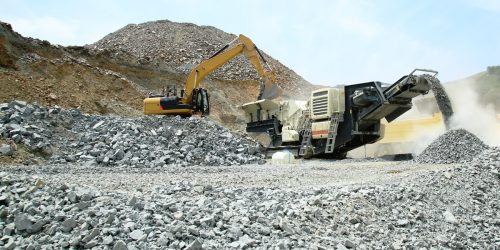
Concrete is one of the most essential building materials in construction projects. It is a versatile and durable material that can be used in various applications, from building foundations to highway and bridge construction. Therefore, choosing the right concrete supplier is critical to ensuring your project is completed on time and within budget.
A reliable concrete supplier like ASR Materials can provide quality products, efficient delivery, and excellent customer service. This article details the factors to consider when choosing a specific supplier and the benefits that can be gained.
What Is A Concrete Supplier?
A concrete supplier is an individual or company that supplies cement, sand, aggregate and soil product, and gravel to the construction industry. They can supply many concrete varieties, ranging from high-strength mixtures for skyscrapers to decorative mixes for patios. They can also use special additives in the mix to offer your concrete special features like waterproofing or rapid setting.
For any good concrete company, it’s not only the concrete mix. A competent concrete supplier works with you every step of the journey, much like a valued partner. They will assist you in determining the correct amount of concrete required, recommending the optimum mix for your project to the manufacturer, and even scheduling delivery around your project timeframe.
Selecting the proper concrete supplier is similar to picking the right superhero for your building project. You want someone dependable, efficient, and capable of doing the work correctly. A very good concrete supplier should have a track record of delivering high-quality products, have excellent customer service, and be responsive to your needs.
Reputable concrete suppliers fall into these two categories; Ready mix and Bulk. Ready-mixed concrete suppliers supply premixed materials for use in construction projects such as roads, bridges, and buildings. Bulk suppliers sell unmixed concrete supplies materials that can be purchased in bulk by those who need them for their own projects or sites.
How To Research Concrete Suppliers?
Identifying the right concrete supplier is crucial for the success of building projects. With so many suppliers to choose from, it might be difficult to choose the right one for your project. Yet, with a little digging, you can find a reliable supplier who meets your needs. Here are the best ways to research the best concrete for your project:
Read Customer Reviews
One of the best ways to research concrete suppliers is to read customer reviews. This will give you an idea of what other people’s experiences have been like when working with the supplier. You can find these reviews on the supplier’s website, social media pages, or review sites like Yelp or Google Reviews. A quick search on Google will give a list of potential suppliers in your area. Search for suppliers with a solid online presence, such as a professional website and active social media profiles.
Check Out The Supplier’s Portfolio
This will give you an idea of the kind of work they’ve done in the past and whether or not they have experience with the type of project you’re planning. You can usually find this information on their website or by asking them directly. Evaluate the concrete products and services they offer. Look to see if they have any specific mixes or additives that may be required for your project.
Check Certification And Licenses
Focus on finding suppliers who have industry-standard accreditation and certifications. This guarantees that they adhere to proper procedures and deliver high-quality items. Visit the supplier’s facilities if possible to see their equipment and manufacturing process. This will offer you a better insight into their capabilities and product quality.
Get Quotes From Multiple Suppliers
Once you’ve narrowed down your list of potential suppliers, reach out to them and ask about their products, services, and pricing. This will provide you with a sense of how responsive they are and how willing they are to work with you. It is also essential to get quotes from multiple concrete suppliers before making your final decision. This will help you compare prices and ensure that you’re getting a fair deal. Make sure that each quote is for the same amount of material and includes all necessary services like delivery and mixing.
Questions To Ask A Concrete Supplier

After research, you would need to book a consultation session with the supplier to converse about the services you require. To help you make a solid decision, here are some questions to ask:
What Kinds Of Concrete Do You Have?
Knowing what types of concrete the supplier offers can help you determine if they can meet the specific requirements of your project. Some concrete suppliers may provide customized mixes or additions to increase the strength or longevity of the concrete. It is important to know if they have the exact concrete required for your project as well as the price for it.
What Is The Strength Of The Concrete You Supply?
Concrete strength is an important component in assessing its durability and suitability for your project. Ask the supplier about the strength of the concrete and whether they can adjust the mix to match your specific requirements. This is essential because do not want weak and low-grade concrete materials for your project.
How Long Have They Been In Business?
This is one of the first questions you should ask a concrete supplier is how long they’ve been in business. This will give you an idea of their experience and whether or not they have a good reputation in the industry. A supplier that has been in business for many years is usually a safe bet as he/she has a lot of tricks on their sleeve that can help your project be a success.
Are They Certified And Insured?
You should also ask about their certifications and insurance. A reputable concrete supplier will have the necessary certifications to prove that they meet safety standards and follow best practices. They should also have liability insurance to protect you in case of any accidents on the job site. You may also need to ask about any guarantees or warranties the supplier offers. This will give you peace of mind knowing that they stand behind their work and are confident in the quality of their materials.
What Is The Procedure For delivery?
Make inquiries with the concrete supplier about their delivery process, including how the concrete is transported and delivered to the job site. You’ll want to be sure the supplier can deliver the concrete when you need it and can meet any unconventional delivery demands you may have. You also need to understand the lead time for concrete delivery. This is critical to ensuring that you get the concrete you require at the right time. Ask about the supplier’s lead time and whether they can accept emergency orders if necessary.
Understand The Supplier’s Service Contract
When choosing a concrete supplier for your construction project, it is essential to understand the contract that you will be signing with them. The contract will outline the terms and conditions of the agreement between you and the supplier. It is crucial to read and understand the contract to ensure that both parties are on the same page and that there are no surprises down the road.
Here are some important things to consider when understanding the contract with a concrete supplier:
Scope Of Work
The contract should clearly outline the scope of work that the concrete supplier will be responsible for. This should include details such as the type and quantity of concrete that will be delivered, the time frame for delivery, and any additional services or materials that will be provided, such as mixing or reinforcement.
Payment Terms
The payment terms should also be clearly outlined in the contract. This should include the total cost of the project, including delivery fees, and when payments are due. You should also make sure that you understand any late payment fees or penalties that may be included in the contract.
Material Quality
The contract should also outline the quality of the materials that will be used for your project. This should include details such as the grade of the concrete, the strength of the mix, and any additional materials that will be used in the mix, such as admixtures or fibers. It is important to ensure that the materials meet the required specifications for your project.
Timeframe
The contract should include a timeframe for the delivery of the concrete. This should include the date and time that the concrete will be delivered to the job site, as well as any additional time required for mixing or preparation. You should also make sure that the timeframe works with your project schedule and that any delays are clearly outlined in the contract.
Liability And Insurance
The contract should outline the liability and insurance requirements for the concrete supplier. This should include details such as their liability insurance coverage, as well as any warranties or guarantees that they offer for their work. It is important to ensure that the concrete supplier has adequate insurance coverage to protect you in case of any accidents or damages on the job or residential site.
Dispute Resolution
Finally, the contract should include a dispute resolution clause. This should outline the steps that will be taken in the event of a dispute between you and the concrete supplier. It is important to ensure that there is a clear and fair process for resolving disputes to avoid any legal issues down the road.
Factors To Consider When Choosing The Right Concrete Supplier For Your Business Material Supply

A reputable concrete supplier will provide high-quality materials that meet the required specifications. This means that your project will be built to last and withstand the test of time. The quality of the concrete is one of the most important elements to consider when choosing a concrete supplier. Consider the type of concrete they supply, its strength and durability, as well as any additives or unique mixtures they provide.
It is also critical to examine the supplier’s location. To reduce shipping expenses and lead time, locate a supplier close to your project site. You should also examine their availability and whether they can meet the deadline for your project. Ensure they have the right transport facilities to transport the suppliers to your building location as well.
The reputation of the premier ready-mix concrete supplier is also an important issue to consider. You can look up online reviews and ratings, get recommendations from other contractors or builders, and verify their accreditation and credentials to guarantee they match industry standards. When selecting a concrete supplier, good customer service is of the utmost importance. You want a supplier who is responsive to questions and worries and can be flexible in meeting the requirements of your project.
The Benefits Of Hiring A Concrete Product Supplier
Finding a suitable concrete supplier is more than just a matter of convenience; it may make or break your building project. While it may appear to be a minor decision, the advantages of choosing the correct concrete supplier are significant and can have a long-term impact on the outcome of your project. Now that you know how to research concrete suppliers let’s talk about the benefits of hiring one for your project.
To begin, selecting the correct concrete supplier can ensure that concrete is delivered to the project site on time. This means you won’t have to wait for hours for the concrete to arrive, reducing downtime and delays in your building project. With a reliable supplier, you can be confident that your project will be completed on time, saving you time and money in the long run.
Secondly, a trustworthy concrete supplier offers superior supplies that ensure the strength and durability of your construction project. Leveraging sub-standard concrete can lead to serious structural difficulties that are costly to repair. By choosing a concrete supplier who values product quality, you can prevent these concerns and ensure that your project lasts for years to come. Concrete suppliers may also have access to experienced professionals who know how to mix and pour concrete correctly. This means that your project will be completed quickly and efficiently, saving you time and money.
Lastly, choosing the right concrete supplier can save money. A supplier with competitive pricing and efficient operations can help you save money on transportation and labor. Also, high-quality concrete that lasts longer means that you won’t have to spend money on repairs or replacements, which will save you even more money in the long run.
You can reduce downtime and delays in your construction project by choosing an experienced concrete supplier for your startup company. This means your plant or asphalt project will stay on schedule, avoiding costly delays and ensuring that you meet your deadlines. A reliable supplier will also be able to provide you with the support you need to troubleshoot any issues that may arise, minimizing the risk of downtime or delays.
Steps To Take When Choosing An Aggregate Concrete Supplier
When it comes to construction projects, one of the most important decisions you’ll make is choosing the correct concrete supplier. A competent concrete supplier can ensure the timely pickup of excellent products, saving you time, money, and headaches in the long run. In this part, we’ll go over the measures you should take when selecting a concrete provider.
Establish Project Requirements
When you begin looking for a concrete supplier, you must first determine the specifications of your project. Consider the amount of concrete necessary, the type of mix required, and the project’s timetable. After you have a firm grasp of your project’s requirements, you may begin looking for a supplier who can meet those needs.
Research Potential Suppliers
Research is crucial when choosing a concrete supplier. You can start by checking their website to learn more about their products and services. You can also look for online reviews and ratings to see what previous customers have to say about their experiences. If you know other contractors or builders, ask for recommendations.

Evaluate Suppliers Using Factors Mentioned Above
When evaluating suppliers, you should consider the factors mentioned earlier in the article. Quality of concrete, location of supplier, reputation, and customer service are all essential considerations. Make a list of potential suppliers and evaluate each one based on these factors.
Request Quotes And Negotiate Pricing
Once you have a shortlist of potential suppliers, request quotes from each one. Compare the quotes and negotiate pricing to find the best deal. Keep in mind that the lowest price isn’t always the best option. You should also consider the supplier’s reputation and the quality of their products.
Finalize The Contract And Monitor The Performance
After you’ve selected a supplier, finalize the contract and monitor their performance throughout the project. Make sure they are delivering the agreed-upon amount of concrete on time and that the quality of the products meets your standards. If there are any issues, address them as soon as possible to prevent delays in your project.
Common Mistakes To Avoid When Choosing A Ready Mix Concrete Supplier
Choosing the right concrete supplier is a crucial step in any construction project. The quality of the concrete and the supplier’s reliability can make or break your project. Unfortunately, there are some common mistakes that people make when choosing a concrete supplier. Here are some of the most common mistakes to avoid when choosing a concrete supplier:
Not Researching The Supplier
One of the most significant mistakes people make when choosing a concrete supplier is not researching the supplier. Some people assume that all concrete suppliers are the same, so they go with the first one they find. However, this can be a costly mistake. You should research your potential supplier by looking at their website, social media pages, and customer reviews. This will give you an idea of their experience, reputation, and the quality of their work.
Getting Only One Quote
Another mistake people make is getting only one quote from a concrete supplier. It’s important to get at least three quotes so that you can compare prices and make sure that you’re getting good value for money with each quote. Don’t be afraid to negotiate with the supplier to get a better deal.
Not Asking The Right Questions
When talking to potential contractors or suppliers, it’s important to ask the right questions. This will help ensure that both parties understand what is required from each other before entering into any kind of contract or agreement.
Some essential questions to ask include:
- How long have you been in business?
- Are you licensed and insured?
- What is your experience with this type of project?
- What is your process for mixing and delivering the concrete?
- What guarantees or warranties do you offer?
- What is the cost of the project, including delivery fees?
Not Checking References
Another common mistake people make when choosing a concrete supplier is not checking the supplier’s references. You should ask the supplier for references and contact them to get an idea of their experience working with this particular supplier. This will help you determine if the supplier is reliable and can deliver quality work.
Choosing Based On Price Alone
While price is an essential factor to consider when choosing a concrete supplier, it should not be the only factor. Sometimes, a supplier may offer a lower price, but this may be because they are cutting corners or using subpar materials. You should also consider the supplier’s experience, reputation, and quality of their work when making your decision.
Not Understanding The Contract
Before signing a contract with a concrete supplier, it’s important to read the contract thoroughly and understand all the terms and conditions. This will help ensure that both parties are on the same page and that there are no surprises down the road. You should also make sure that you’re comfortable with the payment terms and that they fit into your budget.
By avoiding these common mistakes, you can be sure that you’re choosing a reliable supplier who can deliver quality work. Remember to research the supplier, get multiple quotes, ask the right questions, check references, consider more than just price, and understand the contract. With these tips, you’ll be well on your way to finding the right concrete supplier for your project.
In conclusion, before you sign a contract with an aggregate concrete supplier, there are a few final considerations to keep in mind. First, make sure that you read the contract thoroughly and understand all the terms and conditions for the construction materials. Second, ask for a timeline of the project so that you can plan ahead and avoid delays. Finally, make sure that you’re comfortable with the payment terms and that they fit into your budget.
LOOKING FOR THE BEST SUPPLIER IN SOUTH FLORIDA?
YOU FOUND US, ASR MATERIALS.





